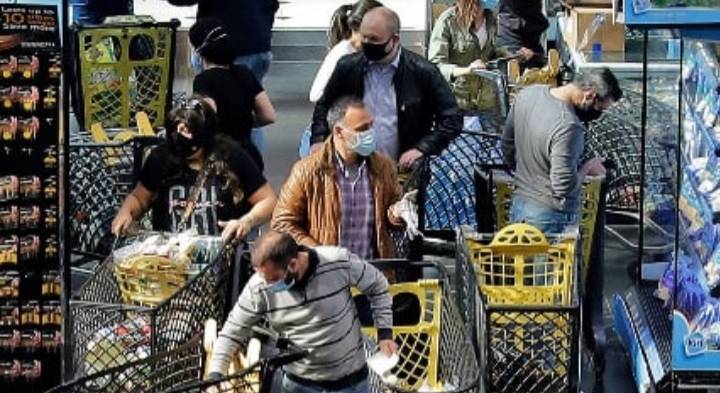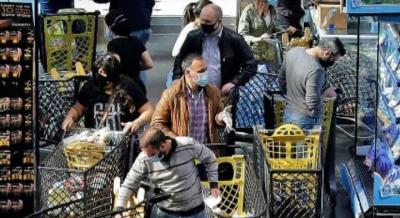The "dollarization" trend is rolling into various sectors in Lebanon, making the decision to price goods in the green currency a reality, whether officially or unofficially. Several sectors had previously decided to price in dollars, either directly or indirectly. Yesterday, the Minister of Economy in the caretaker government, Amin Salam, announced that supermarkets will begin pricing in dollars starting today, Wednesday, based on the black market exchange rate.
This decision comes alongside other measures previously taken regarding different sectors, such as fuels, which are priced in Lebanese pounds but fluctuate based on the black market exchange rate, in addition to medicines, various types of insurance, and hospital services. Meanwhile, salaries in the public sector are paid according to what is known in Lebanon as "Sayrafa Dollar," which is set by the Central Bank of Lebanon and is usually lower than the market rate, allowing employees to benefit from this difference; for example, it is currently set at 45,400 Lebanese pounds compared to approximately 88,000, which is the black market dollar price.
While Lebanese citizens are apprehensive about the implications of dollar pricing in supermarket chains—where most Lebanese go to buy food and consumer goods—especially amid market chaos and lack of oversight, experts believe this could benefit consumers as long as it is accompanied by transparency and consumer protection monitoring. It is noted that prices in Lebanese markets are witnessing unprecedented increases due to merchants adopting what is known as "protective margins against exchange rate fluctuations," which leads them to price products at rates 3,000 to 5,000 Lebanese pounds higher than the market dollar rate.
Acknowledging citizens' entrapment in chaos and stating that "the past financial system has ended and the last strands of its structure have collapsed," the Minister of Economy announced the commencement of dollar pricing, saying: "I resisted the issue of dollar pricing for a year and six months, but I can no longer leave people tied to chaos and randomness. Our goal with this change is to protect the citizen by knowing the actual prices of goods."
He emphasized that supermarkets do not have the right to force customers to pay in dollars, and the invoice will be in Lebanese pounds based on the exchange rate, indicating that the adopted exchange rate must be displayed prominently at the stores. Salam discussed the positives of the decision, describing it as "exceptional," revealing that without the World Bank loan he worked on to maintain subsidies on flour, the price of a loaf of bread would today reach 200,000 pounds.
In contrast, Hani Bahsali, head of the Association of Food Importers, clarified the payment mechanism that will be adopted in supermarkets, considering that "dollar pricing eliminates rampant chaos in prices." He stated: "Pricing in pounds creates protective margins, while pricing in dollars is fixed and can be compared among stores." He added: "The payment mechanism will involve pricing goods on shelves in dollars, while the invoice will be in Lebanese pounds, with the exchange rate clearly announced inside the store, and it will be specified on the invoice according to which exchange rate has been calculated, while value-added tax will be calculated in pounds."
He noted that "dollar pricing will contribute to clearer prices, transparency, and fairness for both the consumer and the trader simultaneously, and that unifying the currency within stores reinstates competition within the correct legal frameworks." Some view that these measures entrench "dollarization" in Lebanon. Economic expert Walid Abu Sleiman believes this can be described as "partial dollarization" rather than "comprehensive dollarization," meaning a complete reliance on the green currency. He indicated that amid the chaos currently dominating markets, dollar pricing might be in the citizen's interest if accompanied by monitoring and transparency.
Abu Sleiman stated to "Asharq Al-Awsat": "What is happening today represents (partial dollarization), as (comprehensive dollarization) cannot be implemented; there are 90 billion dollars in deposits that are not returned to their owners in dollars but are paid in Lebanese pounds. What is disbursed to the public sector according to (Sayrafa Dollar) is either from reserves, meaning money printed within the context of a distinctly inflationary program, which implies we still rely on printing pounds to buy dollars at a time when adequate dollars are not entering to cover the needs of the public and private sectors."
Regarding the impact of dollar pricing on citizens, Abu Sleiman mentioned: "There is no doubt that this decision should be positive for citizens, provided it is accompanied by monitoring from the Consumer Protection Department and limits on merchants' greed, alongside adopting a medium exchange rate published by an official body. However, it simultaneously reflects increasing inflation, loss of the Lebanese pound's value, and exacerbation of the economic and financial situation."




